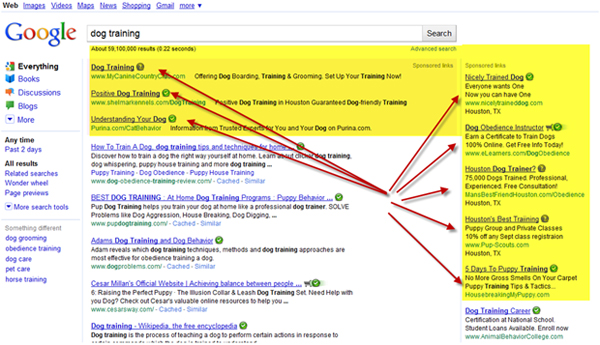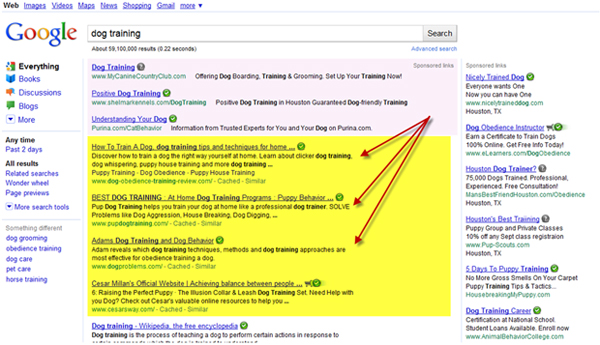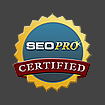How Houston PPC Advertising Works?
PPC is an acronym for Pay-Per-Click. Essentially, just as it sounds, advertisers sign up for an advertising account with the major search engines such as Google, Yahoo and Bing. They setup what is called a PPC Campaign, which consists of keywords they want to target. They then create a series of ads that show up (called impressions) when searchers type in the desired keyword on one of the search engines (see example below).

In the example above, we typed in the keyword “Dog Training” and the response from the search engines shows sponsored ads from advertisers that sell products and services associated with the keyword you are searching for.
If the searcher clicked on the ad, the searcher would be taken to the advertisers website and shown products, services or information relating to Dog Training. The advertiser would pay a rate fee for the click each and every time a client clicks on one of their ads. The process is simple and extremely efficient. The advertiser can setup as many keywords as they want with the understanding that people are going to be clicking on these ads. As a result, the advertisers usually spend adequate time up front to make sure the keywords being clicked and costing them money are indeed related to the products and services they offer. The have the ability to set a limit to the price they are willing to pay for a click (called a bid price) and they can also setup a daily budget to assure they can control their daily spend. Using Pay-Per-Click is a quick and easy way to get your site in front of searchers within one business day. You can have traffic to your site or your phone ringing with new customers that are ready and willing to engage your company for products and services you offer.
While many of the search engines offer Pay-Per-Click programs, the top-3 are Google, Yahoo and Bing (formerly MSN). In terms of market share and advertising spend, Google is clearly the leader with Yahoo not far behind. Bing does not have the adoption rate the Google & Yahoo have. However, many people still have MSN as their home page and use Bing to search when they launch their Internet Explorer browser. All the major search engines have sophisticated conversion tracking and other special features that allow advertisers to clearly see their daily return on investment down to the keyword level.
Planning Is Essential
The search engines are just doing what they do best. Which is to return a search result that is most relevant to what the searcher is searching for based on the keyword typed in the search box. We will discuss the various types of search results in other areas of this site. However for simplicity sake it is important to note that there are two types of search engine results. The first is called Sponsored Ad search results (otherwise referred to as PPC) and we have Organic results. Organic results are the results that show up just under sponsored ads and you do not have to pay when searchers click on your site from this are of the search results (see example below).

The only way to get listed first in the organic ranking area is to code your website according to SEO best practices for OnPage and Offpage ranking factors. With hundreds of millions of sites on the web and thousands that compete for the same keywords, the process can be quite a challenge and SEO expertise is required. While Organic is a challenge, teaming with the right SEO team can reduce the need for PPC expense and bring much more quality steady traffic in the long run.
On the other hand, leveraging Pay Per Click allows you to have your ads showing for specific target keywords or keyword phrases within moments of setting up an account and posting your ads. While each search engine has a unique set of rules for how this works, the concept is essentially same. For the most part, they allow the advertiser willing to pay the most to retain the top spot in the search area. In addition to highest bid, their are other elements that get factored into who gets the top spot such as quality score and longevity. They reward advertisers that use keyword relevance and other PPC ad campaign setup best practices. This means that you can have two advertisers with the same budget and same set of target keywords and the advertiser that has the most optimized ad campaign can get higher ranking, get more clicks and actually pay less per click than other competitors.
Keyword Research Required
Without the right keywords, you might as well take your hard earned money and light it on fire because that is exactly what you are doing - burning money and wasting your advertising budget. Many of you may be thinking “Well how do I find the right keywords”. That is a very good question and the answer is simple - Intelligent industry standard keyword research tools. At 1 Source SEO, we have PPC Consultants that will help you research and target the right keywords. While there are many free keyword suggestion tools out in the marketplace that can provide suggestions on the keywords to use, many times these free tools also include keywords that are related but not necessarily the keywords that you should be paying a click cost for. Some keywords result in what we call curiosity clicks, which means they were interested in seeing the site but not interested in buying anything from you or engaging you for your services.
In addition to targeting specific keywords, many times the best goal is to target keyword phrases. Keyword phrases are usually less competitive and cost less to advertise for. Finding the right keyword phrases takes a special skill set and the team of PPC consultants at 1 Source SEO will locate and propose keyword phrases that will get results.
How To Write Good PPC Ads
Writing effective PPC ads is not a skill set that should be taken lightly. Without proper expertise, writing the wrong ad and not leveraging best practices could be the difference in your ads showing behind your competitors while paying substantially more per click. You obnly have a limited amount of space to begin with and using the right wording while leveraging keywords within the ad is very important. The search engines will not allow certain keywords such as Best, #1, etc. For the sake of example, we have provided an example ad below. Within the ad, we are leveraging best practices while assuring we are not using superlatives such as #1 or Best.
Looking For XYZ?
Save on XYZ Product Today-Buy Online
Same Day Shipping - 24/7 Support
www.XYZsitename.com
Effective Ad Titles
Writing effective Ad titles can make your ad stand out over your competitors. The title of the ad is the very first line and should always have include keyword. Including the keyword in your ad title is one of the factors that helps your overall quality score. While it is important to include the keyword, you also need to make sure the title is catchy and gets the searchers attention. Some advertisers ask a question and end with a question mark. If you ad is the only one that has a question mark, this makes your ad stand out. The choice is yours and 1 Source SEO can help with creative effective ads that get attention. Many times, when you read your competitors ads, you will find they overall offer that they are stating seems to be giving away the farm. For example, your competitor may offer FREE 1 month membership or 100% money back guarantee. You need to be prepared to compete with some of the most intelligent advertiser in the industry and you must be creative to get your ad to stand out and get you the clicks you need to grow your business.
While using words such as free or money back may get your competitors attention you can outsmart them by including effective call to action towards the end of your ad. Ads can be ended with Call Now, Call 999-99-9999 or Free Guide. Effective call to action text will result in searchers clicking through to your site to see what you have to offer. While writing effective ads can take time to perfect, the process of trial and error over time and watching the click through and conversion statistics will indicate the ads that are working vs. the ones that are duds.
Lastly, the URL listed below your ad is also something that the searcher considers before they click on your ad. If the URL does not seem to be related, they may never click on your ad. Alternatively, if you sell MP3 players and the URL below your ad is something like www.TopMP3Players.com, then the domain name alone may be enough to encourage the advertiser to click on the ad. Always remember, try not to make your ad sound too salesy and make sure that within the limited space provided you can articulate your value proposition and offer an effective call to action to get them to your site. When you couple all the above factors of writing an effective ad along with a solid call to action you can surpass your competitors. The team at 1SourceSEO.com can leverage our years of expertise along with industry standard tools and help you grow your business to new heights beyond your imagination. Call us today at 281-547-0939 or click on the Contact Us page to schedule a free consultation.





